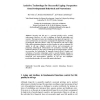Free Online Productivity Tools
i2Speak
i2Symbol
i2OCR
iTex2Img
iWeb2Print
iWeb2Shot
i2Type
iPdf2Split
iPdf2Merge
i2Bopomofo
i2Arabic
i2Style
i2Image
i2PDF
iLatex2Rtf
Sci2ools
108
click to vote
DAGSTUHL
2007
2007
Assistive Technology for Successful Aging: Perspectives from Developmental Behavioral and Neuroscience
Growing into old age is a personal privilege and a societal achievement. However, it is also a challenge for both the individuals and societies. The impressive gains in extending average physical longevity to 75 years and beyond is not necessary accompanied by high-levels of physical, psychological, and brain “fitness”. Thus, it is important to seek ways to help older adults maintaining functions in these domains in order to maintain life quality in old age. Adaptive assistive devices and environments are promising technological advancements for promoting successful aging. Sufficient plasticity in the aging psychological and neurocognitive systems are necessary for technologies to engender desired effects. Designs and evaluations of assistive technologies need to consider dynamic changes in developmental resources across the lifespan. This paper reviews evidence of behavioral and neurocognitive plasticity in old age and highlights psychological principles for successful aging techn...
Average Physical Longevity | DAGSTUHL 2007 | Old Age | Software Engineering | Successful Aging Technologies |
| Added | 29 Oct 2010 |
| Updated | 29 Oct 2010 |
| Type | Conference |
| Year | 2007 |
| Where | DAGSTUHL |
| Authors | Shu-Chen Li, Michael Schellenbach, Ulman Lindenberger |
Comments (0)

